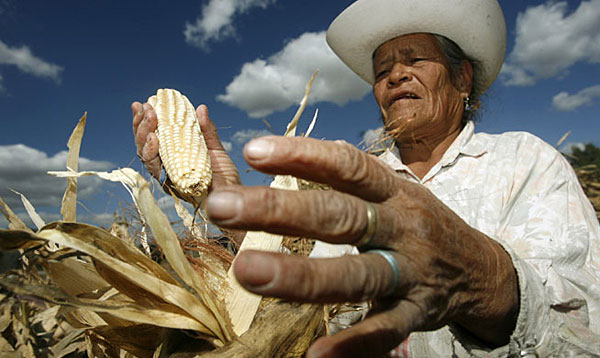
|  |  |  Editorials | Environmental Editorials | Environmental  
Transgenic Corn Trickles into Mexico Despite Fears
 Mica Rosenberg - Reuters Mica Rosenberg - Reuters
go to original
October 06, 2010


| | A Mexican farmer harvesting corn. (Reuters) |  |
Mexico City - Genetically modified corn is trickling into Mexico after overcoming years of legal barriers, but where some farmers see the promise of reduced imports others see a threat to their heritage.

For years the revered status of corn in Mexico, widely believed to be the birthplace of the grain, has made the country hesitant to adopt transgenic maize seeds.

Mexico is a major food importer and is finding itself outpaced by agriculture exporting giants like the United States to the north and Brazil to the south. Proponents of GM crops say they could help reverse the trend.

Last year, after a decade of political wrangling, Mexico completed a package of laws to allow for controlled experiments with the genetically engineered seeds, designed to resist certain pests or herbicides, reduce costs and increase yields.

In small, isolated fields in three states in northern Mexico, Monsanto and Pioneer Hi-Bred, the agricultural unit of DuPont, recently completed the tests with positive results.

It is the first time GM corn seeds have been allowed to take root in Mexican soil since 1998 when the government put a moratorium on studies until a legal framework was in place to regulate the crops.

"We have to recover lost time. Mexico should be using 21st century technology so we can compete and not be an importing country," said Fabrice Salamanca, who heads the group AgroBIO that represents biotech companies participating in the trials.

Companies with experiments verified as safe are aiming to subsidize farmers to launch pilot projects in larger areas next year in the northern states of Sinaloa and Tamaulipas, Salamanca said.

The pilot fields would not exceed around 250 acres, still a tiny fraction of Mexico's 20 million acres (8 million hectares) planted with corn, he said.

Commercial production of GM crops could still be years away. GM cotton plants, less controversial than corn, are only now being grown commercially after 15 years of experimental plantings because of bureaucratic red tape holding up permits, Salamanca said.

CORN GODS

The Mexican farmers interested in GM seeds are major producers who see unfair competition from the United States where the bulk of corn is genetically modified.

Mexico is self-sufficient in white corn used to make the daily staple tortillas, but the country imports around 10 million tonnes of GM yellow corn a year for animal feed.

Big biotech companies see a market for the some 5 million acres (2 million hectares) in Mexico now planted with hybrids seeds bought each year by farmers eager to adopt the latest trends.

The rest of Mexico's corn is grown by small producers, many who use the grain to feed their families and livestock.

Indigenous groups say corn, revered in pre-colonial Mexico by the Mayans and the Aztecs as a god, has sustained generations of farmers who save their red, blue, white and multi-colored corn seeds using techniques passed down for generations.

Authorities mandate the GM test fields are isolated from other corn crops by 2,000 feet and planting dates are staggered to avoid crossing. But anti-GM groups still fear cross-pollination could contaminate the dozens of corn varieties only found in Mexico.

"My grandparents taught my family the process of saving seeds ... (The worry is) we will loose our native corn," Alejandro Nevarez, a Tarahumara agronomist in Chihuahuaha state where there have been some GM experiments.

Nevarez said some Tarahumara people, who live in poverty in the craggy mountains of the picturesque Copper Canyon, have refused government handouts of seeds fearing they are part of the GM tests.

The introduction of GM seeds could just increase the gap between Mexico's rich corn farmers in the north and poor farmers in the south or in indigenous enclaves.

"In subsistence areas the farmers (can't afford) to depend on the market for their seeds," said Carlos Salazar, who heads the country's national corn growers association. "But the commercial areas need the latest technology. We can't limit ourselves."

(Editing by Sofina Mirza-Reid) |

 |
|  |



